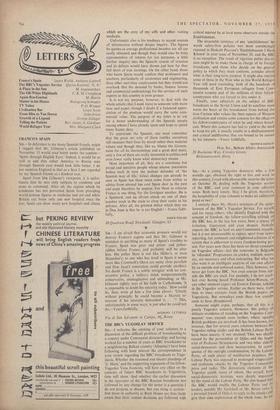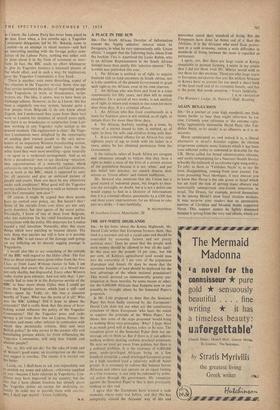SIR,—As a young Yugoslav democrat who, a few months ago,
obtained the right to live and work in this country, I read with pleasurable surprise the letter on October 30, dealing with the Yugoslav service of the BBC, and your comment in your editorial notes. Both were timely. May I be given, therefore, the hospitality of your columns to make an additional point or two?
I entirely share Mr. Mann's strictures of the spine- lessness of the BBC's Yugoslav Service. For myself and for many others, who identify England with the concept of freedom, the fellow-travelling attitude of the BBC has, in the last few years, been a source of irritation, frustration and even despair. Nobody expects the BBC to lead an anti-Communist crusade. but it is not unreasonable to expect, apart from news- reporting, fair comment and enlightened criticism of a system that is abhorrent to every freedom-loving per- son. For years now there has been no direct comment on -Yugoslav affairs—lest the comrades in Belgrade be `offended.' Programmes on cricket, multiple stores, etc., are necessary and often instructing. But what We also want is an intelligent analysis of our own affairs by an outside and unbiased source. That, however, we never get from the • BBC. Not even sources from out- side the BBC are used. For example, I do not recol- lect ever having heard Professor Seton-Watson, or any other eminent expert on Eastern Europe, talking in the YugoslaY service. Earlier on there were, from time to time, extracts from the British papers on Yugoslavia. But nowadays even these few crumbs seem to have disappeared.
Someone might argue. perhaps, that all this is a purely Yugoslav concern. However, this policy of delicate avoidance of treading on the Yugoslav Com- munists' toes extends oven farther, where specific British problems are involved. It has been known, for
instance, that for several years relations between the Yugoslav ruling circles and the British Labour Party have been uneasy. if not strained. This was chiellY caused by the persecution of • Djilas and the bogus trial of Professor Stranjakovic and two other elderly
social-democrats and their incarceration. In conse-
quence of the outright condemnation, by the Labour Party, of such pieces of totalitarian practices, the Labour Party was exposed to prolonged vituperation and malicious attacks by the Yugoslav Communist press and radio. The democratic elements of the
Yugoslav youth, many of whom, like myself, have social-democratic leanings, were deeply impressed by the stand of the Labour Party. We also hoped that the BBC would enable the Labour Party and itS. leaders, notably Mr. Gaitskell or Mr. Bevan (who is a personal friend of Djilas), to reply to the attacks and give their own explanation of the whole issue. So far
as I know, the Labour Party has never been asked to do that. Even when, a few months ago, a Yugoslav Communist delegation, led by Mr. Bakaric, came to London—in an attempt to mend matters—and had an interesting meeting with the foreign policy com- mittee of the Labour Party, nothing was either said or done about it in the form of comment or inter- view. In fact, the BBC made no effort whatsoever to give its Yugoslav listeners a balanced picture of the whole affair, and in such a way, by implication, gave the Yugoslav Communists a free hand.
There is another, even more disturbing, aspect of
the situation in the Yugoslav service. Some time ago that service instituted the policy of 'importing' people from Yugoslavia to work as broadcasters, script- writers, etc. The idea, it seems, was to have been an exchange scheme. However, so far as I know, this has been a singularly one-way system, because quite a few people from Belgrade (1 do not know about Zagreb, but I understand they came from there too) went to London for stretches of several years each, but there is no broadcaster or scriptwriter from Lon- don working in any Yugoslav radio station at the present moment. The explanation is clear : the Yugo- slav Communists were delighted by the opportunity of sending their trusted people to the very nerve- centre of an important Western broadcasting station, where they could snoop and report back. On the other hand they were most unwilling—quite naturally —to agree to a reciprocal arrangement. And so we have a paradoxical—not to say shocking—situation, that representatives of a minority regime, which enforces its rule by police methods and fake elections, are at work at the BBC. which is supposed to cater for all interests and give an unbiased picture of people and events. How can there be any objectivity under such conditions? What good will the Yugoslav service achieve by fraternising in Such an intimate way with the Communist 'new class'?
Of course, it might be argued that these people have no control over policy, etc. But haven't they? Some of the recruits from over there are not only party members, but also agents of the secret police. Personally, I know of one of them from Belgrade. who was notorious for his rabid fanaticism and his connections with the police. His departure for London caused a real sensation. Naturally,, after this many things which were puzzling us became clearer. The only thing that puzzles me still is how is it possible that the BBC is not aware of the damage such goings on are inflicting on its already sagging prestige in Yugoslavia.
I would also like to say something of the attitude
of the BBC with regard to the Djilas affair. The fact that no direct extracts were given either from the New Chas or from Land Without Justice (a fate, I am convinced, that awaits the Anatomy of a Moral) was not only shabby, but disgraceful. Every other Western radio station gave extracts. And not only that: I per- sonally had to tune in to the Bulgarian service of the BBC to hear more about Djilas than I could get from the Yugoslav service. which kept a stiff—and silent—upper lip. Truly, sir, this was a situation worthy of Taper. What was the point of it all? Who was the BBC kidding? Did it hope to please the comrades? Did it really think that this piece of boot- licking would influence the policy of the Yugoslav Communists? Did the Yugoslav press and radio deviate a jot from their line on Cyprus, Nasser. the colonies, and many other subjects in connection with which they perpetually criticise, libel and twist British policy? So why persist in the present silly and humiliating posture which, far from influencing the Yugoslav Communists, will only lose friends and alienate people?
No. sir, this will not do: for the sake of truth and of Britain's good name, an investigation on the lines You suggest is overdue. The sooner it is carried out the better.
Lastly, sir, I shall.have to ask you respectfully not to publish my name and address—otherwise supplied to you—because 1 have relatives in Yugoslavia. Con- ditions may have improved in my country, but the fact that I have chosen freedom has already given the Yugoslav police an excuse for molesting m) family In order not to provide them with another one, I shall sign myself—Yours faithfully,
N. N.



























































 Previous page
Previous page